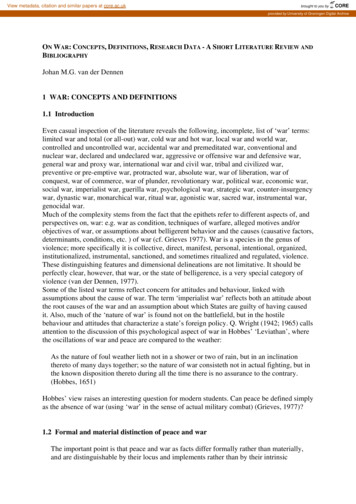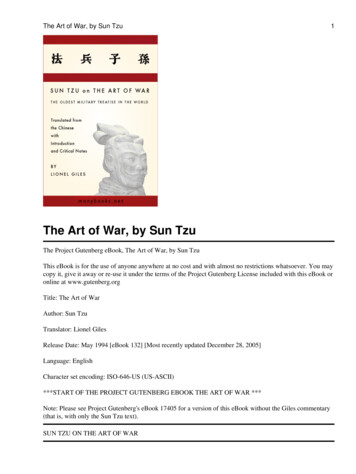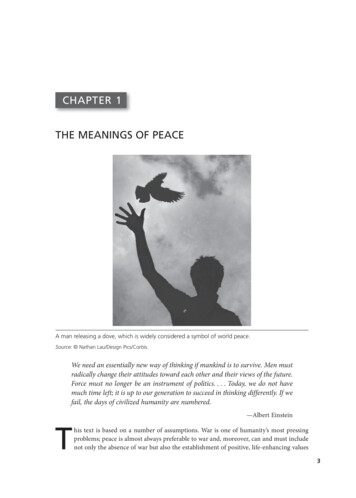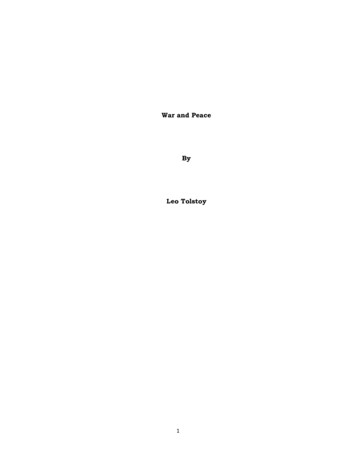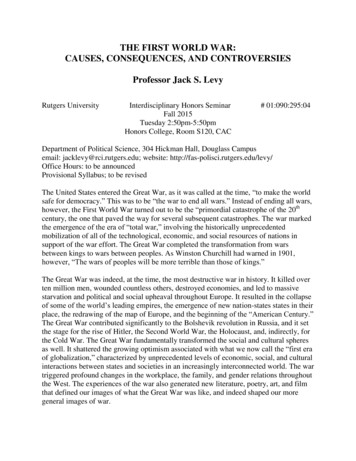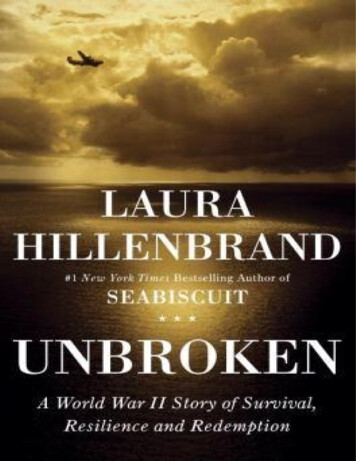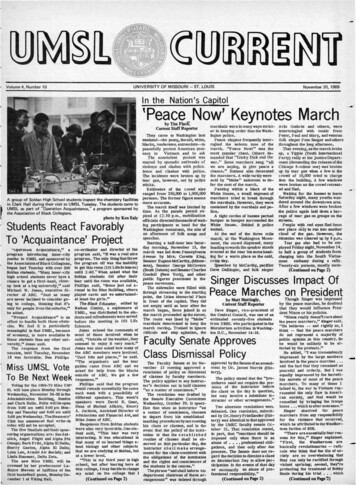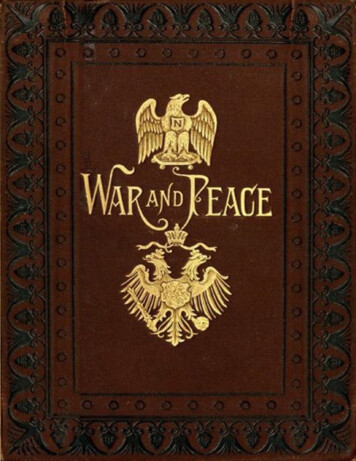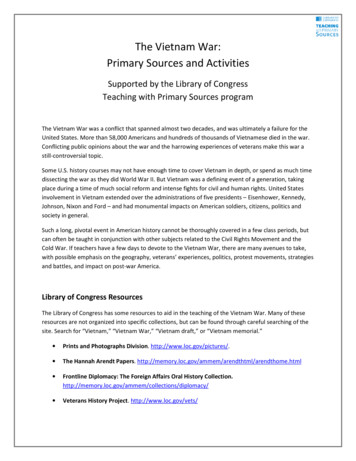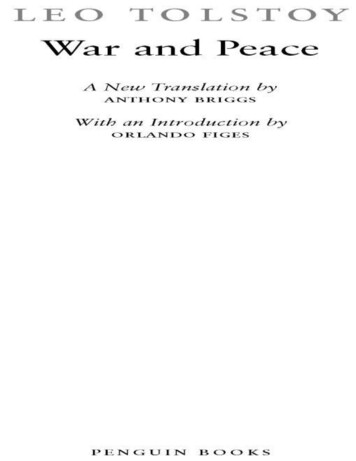
Transcription
Table of ContentsTitle PageCopyright PageIntroductionVOLUME IPART IPART IIPART IIIVOLUME IIPART IPART IIPART IIIPART IVPART VVOLUME IIIPART IPART IIPART IIIVOLUME IVPART IPART IIPART IIIPART IV
EPILOGUEPART IPART IIAppendix 1: - Summary by ChaptersAppendix 2: - The Three BattlesNotesThe CharactersOn War and PeaceAfterword
WAR AND PEACECOUNT LEO TOLSTOY was born in 1828 on the family estate of Yasnaya Polyana in the Tulaprovince. He studied Oriental languages and law at the University of Kazan but left before completing adegree. In 1851 he joined an artillery regiment in the Caucasus. He took part in the Crimean War andafter the defense of Sevastopol wrote The Sevastopol Sketches (1955), which established his literaryreputation. After leaving the army in 1856, Tolstoy spent time in St. Petersburg and abroad beforesettling at Yasnaya Polyana, where he involved himself in the running of peasant schools and theemancipation of the serfs. In 1862 he married Sofya Andreevna Behrs; they had thirteen children.Tolstoy wrote two great novels, War and Peace (1869) and Anna Karenina (1877), as well as manyshort stories and essays. He died in 1910.ANTHONY BRIGGS has written, translated, or edited twenty books in the fields of Russian andEnglish literature, including volumes on Tolstoy and Pushkin. A former professor of Russian at theUniversity of Birmingham, he lives in England.ORLANDO FIGES is the author of A People’s Tragedy: The Russian Revolution 1891-1924 (recipientof the Wolfson Prize for History and the Los Angeles Times Book Prize) and Natasha’s Dance: ACultural History of Russia and a professor of history at the University of London.To request Penguin Readers Guides by mail (while supplies last), please call (800) 7786425 or e-mail reading@us.penguingroup.com.To access Penguin Readers Guides online, visit our Web site at www.penguin.com.
PENGUIN BOOKSPublished by the Penguin GroupPenguin Group (USA) Inc., 375 Hudson Street, New York, New York 10014, U.S.A.Penguin Group (Canada), 90 Eglinton Avenue East, Suite 700, Toronto,Ontario, Canada M4P 2Y3 (a division of Pearson Penguin Canada Inc.)Penguin Books Ltd, 80 Strand, London WC2R 0RL, EnglandPenguin Ireland, 25 St Stephen’s Green, Dublin 2, Ireland (a division of Penguin Books Ltd)Penguin Group (Australia), 250 Camberwell Road, Camberwell,Victoria 3124, Australia (a division of Pearson Australia Group Pty Ltd)Penguin Books India Pvt Ltd, 11 Community Centre, Panchsheel Park, New Delhi – 110 017, IndiaPenguin Group (NZ), cnr Airborne and Rosedale Roads, Albany,Auckland 1310, New Zealand (a division of Pearson New Zealand Ltd)Penguin Books (South Africa) (Pty) Ltd, 24 Sturdee Avenue,Rosebank, Johannesburg 2196, South AfricaPenguin Books Ltd, Registered Offices:80 Strand, London WC2R 0RL, EnglandFirst published in the United States of America by Viking Penguin,a member of Penguin Group (USA) Inc. 2006Published in Penguin Books 2006Translation, “On War and Peace,” and notes copyright Anthony Briggs, 2005Introduction copyright Orlando Figes, 2005All rights reservedTHE LIBRARY OF CONGRESS CATALOGING IN PUBLICATION DATATolstoy, Leo, graf, 1828 – 1910.[Voina I mir. English]War and peace / Leo Tolstoy ; a new translation by Anthony Briggs ;with an introduction by Orlando Figes.p. cm.—(Penguin classics deluxe edition)eISBN : 978-1-101-00383-11. Russia—History—Alexander I, 1801 – 1825—Fiction. 2. Napoleonic Wars,1800 – 1815—Campaigns—Russia—Fiction. I. Briggs, Anthony. II. Title.PG3366.V6 2006b891.73’3—dc22 2006050335The scanning, uploading and distribution of this book via the Internet or via any other means without the permission of the publisher isillegal and punishable by law. Please purchase only authorized electronic editions, and do not participate in or encourage electronic piracyof copyrighted materials. Your support of the author’s rights is appreciated.http://us.penguingroup.com
Introductionby Orlando FigesIn 1951, after reading War and Peace for the twelfth time, the Russian writer Mikhail Prishvin (1873—1954) noted in his diary that he felt, at last, that he understood his life. Like all great works of art,Tolstoy’s masterpiece has the capacity, on each successive reading, to transform our understanding ofthe world.On any first reading, War and Peace is bound to dazzle with its immense panorama of humanity. Thewhole of life appears to be contained in its pages. Tolstoy presents us with a cast of several hundredcharacters. Yet to each one he brings such profound understanding of the human condition, with all itsfrailties and contradictions, that we recognize and love these characters as reflections of our ownidentity.Tolstoy has an extraordinary clarity of expression – a quality which Anthony Briggs has happilymaintained in this superb translation. Tolstoy might write longer novels than anybody else, but no otherwriter can re-create emotion and experience with such precision and economy. There are scenes in Warand Peace – the unforgettable depiction of the Battle of Austerlitz, for example, or the ball whereNatasha Rostov meets Prince Andrey – in which Tolstoy manages in a few words to sketch the mentalimages which allow us to picture ourselves at the scene and seemingly to feel the emotions of theprotagonists. There are passages, like the death-scene of Prince Andrey, in which Tolstoy may give tohis readers the extraordinary sensation that they too have felt the experience of death; and moments, likethe wonderful description of the hunt, when Tolstoy lets them imagine what it is like to be a dog.Tolstoy once said famously that War and Peace was not meant to be a novel at all. Like all greatworks of art, it certainly defies all conventions. Set against the historical events of the Napoleonic Wars,its complex narrative development is a long way from the tidy plot structure of the European novel in itsnineteenth-century form. Tolstoy’s novel does not even have a clear beginning, middle and end, thoughit does, in one sense, turn on a moment of epiphany, the year of 1812, when Russia’s liberation fromNapoleon is made to coincide with the personal liberation of the novel’s central characters.While clearly still a novel, War and Peace can be understood, at another level, as a novelist’s attemptto engage with the truth of history. Tolstoy’s interest in history developed long before his career as anovelist. But history-writing disappointed him. It seemed to reduce the richness of real life. For whereasthe ‘real’ history of lived experience was made up of an infinite number of factors and contingencies,historians selected just a few (for example, the political or the economic) to develop their theories andexplanations. Tolstoy concluded that the histories of his day represented ‘perhaps only 0.001 per cent ofthe elements which actually constitute the real history of peoples’. 1 He was particularly frustrated bythe failure of historians to illuminate the ‘inner’ life of a society – the private thoughts and relationshipsthat make up the most real and immediate experience of human beings. Hence he turned to literature.During the 1850s Tolstoy was obsessed with the idea of writing a historical novel which wouldcontrast the real texture of historical experience, as lived by individuals and communities, with the
distorted image of the past presented by historians. This is what he set out to achieve in War and Peace.Through the novel’s central characters Tolstoy juxtaposes the immediate human experience ofhistorical events with the historical memory of them. For example, when Pierre Bezukhov wanders as aspectator on to the battlefield of Borodino he expects to find the sort of neatly arranged battle scene thathe has seen in paintings and read about in history books. Instead, he finds himself in the chaos of anactual battlefield: Everything Pierre saw on either hand looked so indistinct that, glancing left or right over the landscape,he could find nothing that quite lived up to his expectations. Nowhere was there a field of battle as such,the kind of thing he had expected; there was nothing but ordinary fields, clearings, troops, woods,smoking camp-fires, villages, mounds and little streams. Here was a living landscape, and try as hemight he could not make out any military positioning. He could not even tell our troops from theirs.(Vol. III, Book II, ch. 21)Having served as an officer in the Crimean War (1854—6), Tolstoy drew from his own experience torecreate the human truth of this celebrated battle, and to examine how its public memory could becomedistorted by the medium of written history. As Tolstoy shows, in the confusion of the battle nobody canunderstand or control what occurs. In such a situation, chance events, individual acts of bravery or calmthinking by the officers can influence the morale of the troops en masse and thus change the course ofthe battle; and this in turn creates the illusion that what is happening is somehow the result of humanagency. So when the military dispatches are later written up, they invariably ascribe the outcome of thebattle to the commanders, although in reality they had less influence than the random actions of the rankand file. By using these dispatches, historians are able to impose a rational pattern and ‘historicalmeaning’ on the battle, although neither was apparent at the time of fighting.As a novelist, Tolstoy was interested most of all in the inner life of Russian society during theNapeolonic Wars. In War and Peace he presents this period of history as a crucial watershed in theculture of the Russian aristocracy. The war of 1812 is portrayed as a national liberation from the culturaldomination of the French – a moment when Russian noblemen like the Rostovs and Bolkonskysstruggled to break free from the foreign conventions of their society and began new lives on Russianprinciples. Tolstoy plots this transformation in a series of motifs. In Tolstoy’s text the novel opens, forexample, in the French language of the Petersburg salon – a language that Tolstoy gradually reveals tobe false and artificial (the novel’s most idealized characters, such as Princess Marya and the peasantKaratayev, speak exclusively in Russian, or, like Natasha, speak French only with mistakes). Tolstoyshows the aristocracy renouncing haute cuisine for Spartan lunches of rye bread and cabbage soup,adopting national dress, settling as farmers on the land and rediscovering their country’s native culture,as in the immortal scene when Natasha, a French-educated young countess, dances to a folk song in theRussian style.On this reading, War and Peace appears as a national epic – the revelation of a ‘Russianconsciousness’ in the inner life of its characters. In narrating this drama, however, Tolstoy steps out ofhistorical time and enters the time-space of cultural myth. He allows himself considerable artisticlicence. For example, the aristocracy’s return to native forms of dress and recreations actually tookplace over several decades in the early nineteenth century, whereas Tolstoy has it happen almostovernight in 1812. But the literary creation of this mythical time-space was central to the role whichWar and Peace was set to play in the formation of the national consciousness.When the first part of the novel appeared, in 1865-6, educated Russia was engaged in a profoundcultural and political quest to define the country’s national identity. The emancipation of the serfs, in
1861, had forced society to confront the humble peasant as a fellow-citizen and to seek new answers tothe old accursed questions about Russia’s destiny in what one poet (Nikolay Nekrasov) called the ‘ruraldepths where eternal silence reigns’.2 The liberal reforms of Tsar Alexander II (Emperor of Russia1855-81), which included the introduction of jury trials and elected institutions of local government,gave rise to hopes that Russia, as a nation, would emerge and join the family of modern Europeanstates. Writing from this perspective, Tolstoy saw a parallel between the Russia of the 1860s and theRussia that had arisen in the wars against Napoleon.War and Peace was originally conceived and drafted as a novel about the Decembrists, a group ofliberal army officers who rose up in a failed attempt to impose a constitution on the Tsar in December1825. In this original version of the novel the Decembrist hero returns after thirty years of exile inSiberia to the intellectual ferment of the early years of Alexander II’s reign. But the more Tolstoyresearched into the Decembrists, the more he realized that their intellectual roots were to be found in thewar of 1812. This was when these officers had first become acquainted with the patriotic virtues of thepeasant soldiers in their ranks; when they had come to realize the potential of Russia’s democraticnationhood. Through this literary genesis, War and Peace acquired several overlapping spheres ofhistorical consciousness: the real-time of 1805-20 (the fictional setting of the novel); the living memoryof this period (from which Tolstoy drew in the form of personal memoirs and historical accounts); andits reflection in the political consciousness of 1855-65. Thus the novel can and should be read, not justas an intimate portrait of Russian society in the age of the Napoleonic Wars, but as a broader statementabout Russia, its people and its history as a whole. That is why the Russians will always turn to War andPeace, as Mikhail Prishvin did, to find in it the keys to their identity.English readers will learn more about the Russians by reading War and Peace than they will byreading perhaps any other book. But they will also find in it the inspiration to make them think aboutthe world and their own place in it. For War and Peace is a universal work and, like all the great artisticprose works of the Russian tradition, it functions as a huge poetic structure for the contemplation of thefundamental questions of our existence.Above all, War and Peace will move readers by virtue of its beauty as a work of art. It is a triumphantaffirmation of human life in all its richness and complexity. That is why one can return to it and alwaysfind new meanings and new truths in it.NOTES1 Cited in Isaiah Berlin, Russian Thinkers, edited by Henry Hardy and Aileen Kelly (Harmondsworth,Penguin, 1994), pp. 32—3.2 From ‘Silence’ (1857) in N. A. Nekrasov, Sochineniia (3 vols., Moscow, 1959), Vol. I, p. 201.
VOLUME I
PART I
CHAPTER 1‘Well, Prince, Genoa and Lucca are now nothing more than estates taken over by the Buonapartefamily.1 No, I give you fair warning. If you won’t say this means war, if you will allow yourself tocondone all the ghastly atrocities perpetrated by that Antichrist – yes, that’s what I think he is – I shalldisown you. You’re no friend of mine – not the “faithful slave” you claim to be . . . But how are you?How are you keeping? I can see I’m intimidating you. Do sit down and talk to me.’These words were spoken (in French) one evening in July 1805 by the well-known Anna PavlovnaScherer, maid of honour and confidante of the Empress Maria Fyodorovna, as she welcomed the firstperson to arrive at her soirée, Prince Vasily Kuragin, a man of high rank and influence. Anna Pavlovnahad had a cough for the last few days and she called it la grippe – grippe being a new word not yet incommon currency. A footman of hers in scarlet livery had gone around that morning delivering noteswritten in French, each saying precisely the same thing:If you have nothing better to do, Count (or Prince), and if the prospect of spending an evening with apoor sick lady is not too unnerving, I shall be delighted to see you at my residence between seven andten. ANNETTE SCHERER‘My goodness, what a violent attack!’ replied the prince, who had only just come in and was not inthe least put out by this welcome. Dressed in his embroidered court uniform with knee-breeches, shoesand stars across his chest, he looked at her with a flat face of undisturbed serenity. His French was theelegant tongue of our grandparents, who used it for thought as well as speech, and it carried the softtones of condescension that come naturally to an eminent personage grown old in high society and atcourt. He came up to Anna Pavlovna and kissed her hand, presenting to her a perfumed and glisteningbald pate, and then seated himself calmly on the sofa.‘First things first,’ he said. ‘How are you, my dear friend? Put my mind at rest.’ His voice remainedsteady, and his tone, for all its courtesy and sympathy, implied indifference and even gentle mockery.‘How can one feel well when one is . . . suffering in a moral sense? Can any sensitive person findpeace of mind nowadays?’ said Anna Pavlovna. ‘I do hope you’re staying all evening.’‘Well, there is that reception at the English Ambassador’s. It’s Wednesday. I must show my face,’ saidthe prince. ‘My daughter is coming to take me there.’‘I thought tonight’s festivities had been cancelled. I must say all these celebrations and fireworks arebecoming rather tedious.’‘If they had known you wanted the celebration cancelled, it would have been,’ said the prince withthe predictability of a wound-up clock. Sheer habit made him say things he didn’t even mean.‘Stop teasing me. Come on, tell me what’s been decided about Novosiltsev’s dispatch?2 You knoweverything.’‘What is there to tell?’ replied the prince in a cold, bored tone. ‘What’s been decided? They’vedecided that Bonaparte has burnt his boats, and I rather think we’re getting ready to burn ours.’Prince Vasily always spoke languidly, like an actor declaiming a part from an old play. AnnaPavlovna Scherer was just the opposite – all verve and excitement, despite her forty years. To be anenthusiast had become her special role in society, and she would sometimes wax enthusiastic when she
didn’t feel like it, so as not to frustrate the expectations of those who knew her. The discreet smile thatnever left her face, though it clashed with her faded looks, gave her the appearance of a spoilt child witha charming defect that she was well aware of, though she neither wished nor felt able to correct it, noreven thought it necessary to do so.Then suddenly in the middle of this political discussion Anna Pavlovna launched forth in greatexcitement. ‘Oh, don’t talk to me about Austria!3 Perhaps it’s all beyond me, but Austria has neverwanted war and she still doesn’t want war. She’s betraying us. Russia alone must be Europe’s saviour.Our benefactor is aware of his exalted calling and he’ll live up to it. That’s the one thing I do believe in.The noblest role on earth awaits our good and wonderful sovereign, and he is so full of decency andvirtue that God will not forsake him. He will do what has to be done and scotch the hydra of revolution,which has become more dreadful than ever in the person of this murdering villain.4 We alone mustavenge the blood of the righteous. And whom can we trust, I ask you? England, with that commercialspirit of hers, cannot understand the lofty soul of our Emperor Alexander, and never will. She hasrefused to evacuate Malta.5 She keeps on looking for an ulterior motive behind our actions. What didthey say to Novosiltsev? Nothing. They didn’t understand, they’re not capable of understanding, howaltruistic our Emperor is – he wants nothing for himself but everything for the good of mankind. Andwhat have they promised? Nothing. And what little they have promised, they won’t carry out. Prussiahas already declared that Bonaparte is invincible and that the whole of Europe is powerless to opposehim . . . I for one don’t believe a single word from Hardenberg or Haugwitz. That much-vauntedPrussian neutrality is just a trap. I put my faith in God and the noble calling of our beloved Emperor.He’ll be the saviour of Europe!’She stopped suddenly, amused at her own passionate outburst.‘I think if they had sent you instead of our dear Wintzengerode,’6 said the prince with a similar smile,‘an onslaught like that from you would have got the King of Prussia to agree. You are so eloquent. MayI have some tea?’‘Yes, of course. By the way,’ she added, calming down, ‘there are two very interesting men cominghere tonight – the Vicomte de Mortemart, a Montmorency through the Rohan line, one of the bestFrench families. He’s the right kind of émigré, one of the genuine ones. And the Abbé Morio – such aprofound thinker. Do you know him? He’s been received by the Emperor. Have you heard?’‘Oh, it will be a pleasure to meet them,’ said the prince. ‘But tell me,’ he added, with studiednonchalance, as if an idea had just occurred to him, though this question was the main reason for hisvisit, ‘is it true that the Dowager Empress wants Baron Funke to become First Secretary in Vienna?They do say he’s a miserable creature, that baron.’Prince Vasily wanted this post for his son, but other people were working through the Empress MariaFyodorovna to get it for the baron. Anna Pavlovna half-closed her eyes to indicate that neither she noranyone else could pass judgement on what the Empress might feel like doing or want to do. ‘BaronFunke has been recommended to the Dowager Empress by her sister,’ was all she said, in a dry,lugubrious tone. As she pronounced the name of the Empress, Anna Pavlovna’s face took on anexpression of profound and sincere devotion mixed with respect and tinged with sadness, whichinvariably came upon her when she had occasion to mention her exalted patroness. She said that herMajesty had been gracious enough to show Baron Funke great respect, at which her face once againdissolved into sadness.The prince said nothing and showed no feeling. Anna Pavlovna, with all the sensitivity and quickthinking of both a courtier and a woman, decided to rebuke the prince for daring to refer in such a wayto a person recommended to the Empress, and at the same time to console him. ‘But, on the subject of
your family,’ she said, ‘do you realize how much your daughter has delighted everyone in society sinceshe came out? They say she’s as beautiful as the day is long.’The prince bowed as a mark of his gratitude and respect.‘I often think,’ Anna Pavlovna resumed after a short pause, edging closer to the prince and smilingsweetly to indicate that the political and social conversation was now at an end, and personalconversation was in order, ‘I often think that good fortune in life is sometimes distributed most unfairly.Why has fate given you two such splendid children? I don’t include Anatole, your youngest – I don’tlike him,’ she commented in a peremptory tone and with raised eyebrows. ‘Such charming children.And I must say you seem to appreciate them less than anyone. You really don’t deserve them.’And she smiled her exuberant smile.‘What can I do? Lavater would have said that I have no paternity bump,’7 said the prince.‘Oh, do stop joking. I wanted a serious talk with you. Listen, I’m not pleased with your younger son.Just between ourselves,’ her face went all gloomy again, ‘his name has been mentioned in her Majesty’spresence, and people are feeling sorry for you . . .’The prince said nothing, while she gave him a knowing look, waiting in silence for his reply. PrinceVasily frowned.‘What can I do?’ he said at last. ‘You know I’ve done everything a father could do to bring them upwell, and they have both turned out to be idiots. At least Hippolyte’s a fool on the quiet – Anatole’s therowdy one. That’s the only difference between them,’ he said, with an unusually awkward and forcedsmile, which gave a sharp twist to the lines round his mouth, making it surprisingly ugly and coarse.‘Why do men like you have children? If you weren’t a father, I could find no fault with you,’ saidAnna Pavlovna, looking up pensively.‘I’m your faithful slave. I wouldn’t admit it to anyone else, but my children are the bane of my life.They’re the cross I have to bear. That’s how I explain it to myself. What would you . . . ?’ He broke offwith a gesture that signalled his resignation to a cruel fate. Anna Pavlovna thought things over.‘That prodigal son of yours, Anatole, haven’t you thought of marrying him off? They do say,’ shewent on, ‘that old maids have a mania for matchmaking. So far I’ve never been conscious of this failingin myself, but I do have a certain little person in my mind, someone who is very unhappy with herfather – a relative of ours, the young Princess Bolkonsky.’Prince Vasily made no reply, but being quick on the uptake and good at remembering things –qualities that came naturally to the denizens of high society – he gave a slight nod to show that he hadnoted her comment and was considering it.‘No, listen, do you realize that boy’s costing me forty thousand roubles a year?’ he said, obviouslyunable to check the dismal drift of his thinking. He paused. ‘What will it be like in five years’ time if hecarries on like this? You see what the benefits of fatherhood are . . . This princess of yours, is she rich?’‘Her father’s a very rich man and a miser. He lives out in the country. You know, Prince Bolkonsky.He’s very well known. He retired under the late Emperor. They used to call him the “the King ofPrussia”. He’s a very clever man, but he’s a crank, not easy to get on with. Poor little thing, she’s asmiserable as any girl could be. It was her brother who married Liza Meinen not too long ago. He’s oneof Kutuzov’s adjutants. He’s coming here tonight.’‘Listen, my dear Annette,’ said the prince, suddenly taking his companion’s hand and pressing itdownwards for reasons best known to himself. ‘You set this up for me, and I’ll serve you like a faithfulslave for ever. (Or slafe, with an ‘f’, as my village elder puts it when he writes to me.) She’s a girl froma good family, and she’s rich. That’s all I need.’And with the freedom, familiarity and sheer style that were his hallmark, he took hold of the maid of
honour’s hand, kissed it and gave it a little shake, easing back into his armchair and looking away fromher.‘Wait a minute,’ said Anna Pavlovna, thinking things over. ‘I’ll have a little talk with Lise, youngBolkonsky’s wife, this very evening. Perhaps something can be arranged. I’ll use your family to startlearning the old maid’s trade.’
CHAPTER 2Anna Pavlovna’s drawing-room was steadily filling up. All the important people in St Petersburgsociety were there, varying enormously in age and character for all their shared social background.Prince Vasily’s daughter, the beautiful Hélène, had just arrived to take him on to the Ambassador’sreception; she was wearing a ballgown enhanced by a maid of honour’s monogram. The young PrincessBolkonsky, a slip of a girl known as the most seductive woman in Petersburg, was there too; married theprevious winter, she no longer appeared at large occasions because she was pregnant, but she did stillattend small soirées. Prince Vasily’s son, Prince Hippolyte, arrived with Mortemart, and introduced him.Also present were the Abbé Morio and many other people.Anna Pavlovna was welcoming her guests as they arrived with a ‘Have you met my aunt?’ or ‘I don’tthink you know my aunt’ before steering them with great solemnity towards a little old lady with bigbows in her hair, who had come sailing in from the next room as soon as the guests had begun to arrive.Anna Pavlovna would announce them by name, slowly transferring her gaze from guest to aunt, andthen move on. All the guests went through the motions of greeting this aunt, who was unknown,uninteresting and unneeded by anyone. Anna Pavlovna observed their greetings with sadness andsolemn sympathy, a picture of silent approval. The lady known as ‘my aunt’ spoke in the same way toevery new arrival, commenting on their health, her own health and the health of her Majesty, who wasby now, thank God, feeling better. All those who approached were polite enough to refrain fromshowing undue haste, but once this onerous duty had been fulfilled they walked away from the old ladywith a sense of relief, and never went near her again all evening.Young Princess Bolkonsky had brought some work with her in a gold-embroidered velvet bag. Herpretty little upper lip, slightly shadowed with down, barely covered her teeth, but that made it all theprettier when it rose up and lovelier still when it curled down to meet the lower lip. As tends to happenwith the best-looking women, a defect – in this case a short lip and a half-open mouth – came out as adistinctive and beautiful feature. Everyone enjoyed the sight of this pretty little mother-to-be, brimmingwith health and vitality and making light of her condition. After a few minutes in her company and theexchange of a word or two, old men and bored, morose young men felt as if they themselves werebecoming like her. Anyone who talked to her, watching her as every word she spoke revealed that brightlittle smile and the constant gleam of those dazzling white teeth, walked away feeling full of bonhomie.Everybody did.The little princess waddled slightly as she tripped rapidly round the table, holding her tiny workbag,then she cheerfully smoothed down her dress and sat on a sofa near the silver samovar. Everything shedid seemed like a treat for herself and everyone around her.‘I’ve brought my work,’ she said in French, opening her reticule and addressing all the company. ‘Butlisten, Annette, you must stop playing tricks on me,’ she said, turning to the hostess. ‘You wrote andsaid it was only a little party. Just look what I’ve got on.’ And she spread her arms wide to display anelegant grey dress, decorated with lace and set off by a broad sash just below the bosom.‘Don’t worry, Lise, you’ll always be the prettiest,’ answered Anna Pavlovna.‘Did you know my husband is deserting me?’ she said to a general, continuing to speak French andusing just the same tone. ‘He’s going off to get himself killed. Do tell me what this awful war is all
about,’ she asked of Prince Vasily, but before he could answer she had moved on to h
Tolstoy wrote two great novels, War and Peace (1869) and Anna Karenina (1877), as well as many short stories and essays. He died in 1910. ANTHONY BRIGGS has written, translated, or edited twenty books in the fields of Russian and English literature, including volumes on Tolstoy
